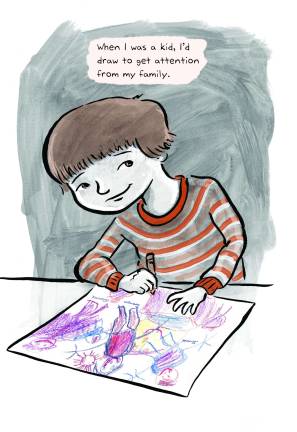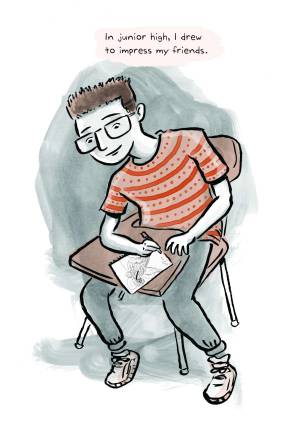Jarrett Krosoczka has gained a devoted fanbase across the country. His books, including a popular collection of graphic novels about a superhero lunch lady, and a chapter book series about a platypus police squad, are known for being quirky and engaging escapes for young readers. But "Hey, Kiddo," his latest work just released last week, is steeped in reality—and has already been tapped as finalist for the National Book Award.
Tell me about "Hey, Kiddo."
"Hey, Kiddo" is a graphic memoir about my upbringing and it's told from the perspective of my 17-year-old self as I recount what brought me to live with my grandparents, and what separated me from my mother; I later learn in upper elementary school was that she was addicted to heroin. It also covers a time where I just wonder who my father was because I did not meet him until I was 17.
But throughout all of the chaos, I was very much loved by my grandparents and I had friends who stood by me through everything--and I had art. I love to draw.
So really, "Hey, Kiddo" is a celebration of what family is and it's a celebration of the power of art and creativity to get into some rough patches.
How do you define “family”?
Family is a group of people that love and support one another.
What did you draw as a kid?
I would draw people, I would draw monsters, I would draw superheroes. I would sort of draw sort of abstract versions of my emotions.
I just dove into my sketchbooks. Many of those sketchbooks were used for the art of the book, and I definitely used the sketch books again to get into the psyche of where I was at 17. I used them as an escape portal.
What inspired you to actually write and create “Hey, Kiddo”?
It's a book that I've been wanting to write for several years, but what really energized it was the reaction I got from a TED Talk I delivered in 2012. I was a last-minute replacement for the headliner at a TEDxHampshireCollege Tech Conference. I only had about four hours to get over there, get myself together, and put together a talk. When I was pacing the kitchen floor wondering what I was going to present, my wife Gina really encouraged me and empowered me to share some of my upbringing being the son of a person that was addicted to drugs.
So that talk went viral, and as I would travel the country with my children's books, it wouldn't matter what city or town or state I was in, I would meet young people who were dealing with similar afflictions. It would be either a situation in which they were upfront with it themselves or an adult at the school would just say: "You know, we have a lot of students that are dealing with this just like you did."
That's what made me switch from thinking, "Oh, this is a book that I have always wanted to write" to becoming "This is a book I really need to write." I really felt the responsibility, and that I had this power to share this story in a very unique way that would allow those young readers to be seen and let them know they're not alone in this fight.
What is one piece of advice that you have for teenagers today?
Being a young person or a teenager can be difficult because you're not in charge of a lot of the things happening around you. You're not necessarily charge of where you live or where you're surrounded by, but the beautiful thing about growing up is that you can create your own reality for yourself.
My passion was art. Whatever passion a young person has--that's something they can dive headfirst into and that could be their ticket out of whatever situation that they're in.
What has the reaction to “Hey, Kiddo” been thus far?
It has been overwhelmingly positive. I've had great reviews from The New York Times and NPR. I haven't even been able to keep up on my Twitter mentions; everyone’s posting photos at the bookstore. I just feel very lucky that I'm able to put this book out to the world.

